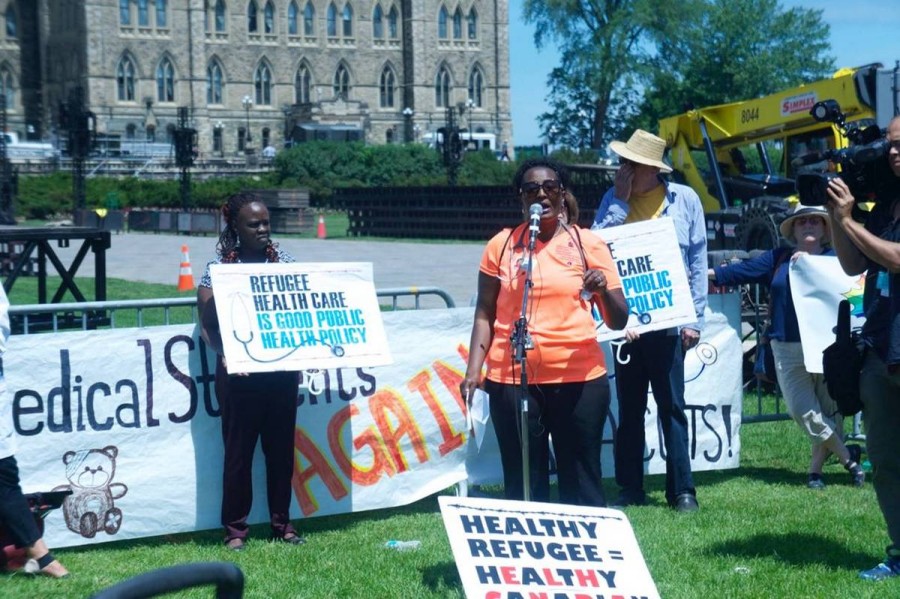
Monday 15 June
On April 25th, 2012, the federal government announced a series of sweeping changes to the Interim Federal Health Program (IFHP), which provides health insurance for refugees in Canada. Immediately after the decision was announced, doctors and health care workers rallied together to protest the cuts, which they feared would leave a vulnerable population without access to essential health services and would cause chaos for healthcare providers. As a result of significant public pressure, the government subsequently announced that government-assisted refugees would not be impacted by the cuts. For all other refugees, the cuts came into effect on June 30th, 2012.
On Monday 15th June, representatives of various health organisations including Canadian Doctors for Refugee Care (CDRC), Somerset West Community Health Centre, plus groups representing nurses, social workers, pharmacists, occupational therapists and other health disciplines, assembled at Parliament Hill to protest the cuts which they submit, impact on the most vulnerable members of our population.
According to a statement issued by the organisers, the previous IFH program, which had been in place since 1957, provided access to medical care, diagnostic services and laboratory testing that was very similar to what is provided by provincial health plans. It also provided medications, emergency dental care and vision care similar to what is available to people on provincial social assistance plans. They point out that, to understand the cuts, it is important to recognize the different types of refugees in Canada. Privately sponsored refugees are those who were identified as refugees pre-migration to Canada, while refugee claimants make their claims after arriving in Canada. Of the latter type, there are two categories – those from 37 designated countries of origin (DCO), which the federal Ministry for Citizenship and Immigration believes should not be producing refugees, and those from all other countries.
Due to the cuts to the IFHP, all refugees except government-assisted refugees lost access to medication coverage, vision and dental care. People from DCOs lost all health coverage including for urgent and essential care, except in cases of public health concerns or issues of public security. They only were eligible for drug coverage if on social assistance. Furthermore according to the organisarers, many refugees have suffered as a result of the cuts. Canadian Doctors for Refugee Care (CDRC) has documented many cases of people being denied access to necessary health care services including pregnant women and sick children. Various media have also reported shocking examples of very ill patients being denied care because they were not insured by the federal government.
At the time of the cuts, CDRC had warned that the changes to the IFHP would not yield any cost savings for the government. Restricting access to preventive care leads to repeated emergency room visits and hospitalizations that increase costs to the health system. CRDC estimates that five Toronto-area hospitals alone account for more than $1 million in unexpected costs due to providing necessary health care to refugees who are no longer insured by the federal government.
Canadian Doctors for Refugee Care claims the support of over 20 health care organizations, including: the College of Family Physicians of Canada, the Royal College of Physicians and Surgeons of Canada, the Canadian Association of Optometrists, the Canadian Association of Social Workers, the Canadian Dental Association, the Canadian Medical Association, the Canadian Nurses Association, the Canadian Pharmacists Association, the Canadian Association of Community Health Centres, Canadian Doctors for Medicare, the Canadian Association of Midwives, the Registered Nurses Association of Ontario, the Canadian Federation of Nurses Union, the Canadian Psychiatric Association, the Canadian Paediatric Society, the Association of Medical Microbiology and Infectious Diseases Canada, Médecins du Monde, Public Physicians of Canada, Ontario’s Council of Medical Officers of Health, the Canadian Association of Occupational Therapists, the Canadian Association of Emergency Physicians and the Dieticians of Canada.
For more information please visit:
https://www.facebook.com/RefugeeHealthCare
https://twitter.com/docs4refugeehc
Photo credit: Hector Addison, Somerset West Community Health Centre









